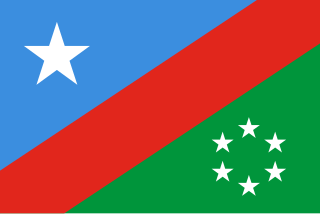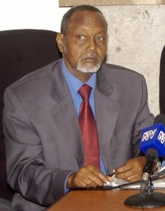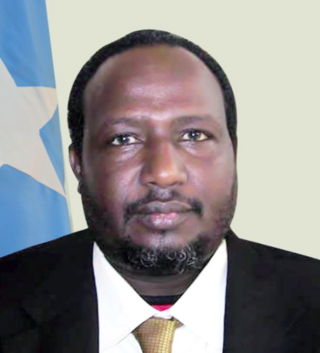
The South-West State of Somalia, is a Federal Member State in southwestern Somalia. It was founded by Hasan Muhammad Nur Shatigadud, leader of the Somalia RRA on 1 April 2002. It was the third autonomous region to be established.

Baidoa is the largest city of the South West State of Somalia.
Hussein Mohamed Farrah Aidid is the son of General Mohamed Farrah Aidid. His father was leader of the Somali National Alliance (SNA), the faction that fought UNOSOM II and US forces during 1993.
The United Somali Congress (USC) was one of the major rebel organizations in Somalia. Formed in 1989, it played a leading role in the ouster of the government of Siad Barre in 1991, and became a target of the Unified Task Force campaign in 1993. Following infighting, the USC later splintered into smaller groups. By 2000, with the establishment of a Transitional National Government (TNG), a process of disarmament was put in motion and some moderate ex-USC leaders were incorporated into the new interim administration.

The Somali Civil War is an ongoing civil war that is taking place in Somalia. It grew out of resistance to the military junta which was led by Siad Barre during the 1980s. From 1988 to 1990, the Somali Armed Forces began engaging in combat against various armed rebel groups, including the Somali Salvation Democratic Front in the northeast, the Somali National Movement in the northwest, and the United Somali Congress in the south. The clan-based armed opposition groups overthrew the Barre government in 1991.

The Rahanweyn, also known as the Digil and Mirifle are a major Somali clan. It is one of the major Somali clans in the Horn of Africa, with a large territory in the densely populated fertile valleys of the Jubba and Shebelle rivers and the areas inbetween which are mainly inhabited by settlers from the Digil and Mirifle lineages.

The Transitional National Government (TNG) was the internationally recognized central government of Somalia from 2000 to 2004.
Abdallah Deerow Isaaq, sometimes Abdullah Deerow Isaq, was a Somali politician. He served as the first Speaker of Parliament in the Transitional National Government of Somalia from 2000 to 2003, and was later the Minister of Constitutional and Federal Affairs in the Transitional Federal Government. He was assassinated in July 2006.
Following the civil war and the ensuing societal chaos, some factions managed to exert a degree of authority over certain regions of Somalia where they maintained broad, clan-based support. This allowed these factions to establish working administrations and eventually coherent states, and restored order to their regions. This occurred first in Puntland, Southwestern Somalia, Galmudug, Jubaland and finally Banadir.
Aden Mohamed Nur Saran-Sor, commonly known as Aaden Saransoor, is a Somali warlord. He is a commander in the Rahanweyn Resistance Army (RRA), and his militia is in control of Baidoa, seat of the Transitional Federal Parliament.
Mohamed Qanyare Afrah (Somali: Maxamed Qanyare Afrax, Arabic: محمد افراح قنياري} was a Somali faction leader and politician who was based south of Mogadishu in the Daynile District. He came in third position in Somalia's first election as a federal country on 10 October 2004 and was subsequently appointed minister of public security in the government of Prime Minister Ali Mohammed Ghedi, He served as minister of security in 2006 but was dismissed after ignoring calls by the Prime Minister Ali Mohammed Ghedi to stop fighting forces of the Islamist Courts. He continued to participate actively in Somali political affairs being reelected to the first post transitional federal parliament of Somalia as a member of parliament, he resigned from his seat representing his clan in the summer of 2013, his seat in the Federal Parliament of Somalia was taken over by his son Cabdiweli Mohamed Qanyare.
The Somalia Reconciliation and Restoration Council (SRRC) was a political movement and paramilitary organization based in southern Somalia. It was founded in 2001 by Hussein Mohamed Farrah Aidid, son of the late faction leader Mohamed Farrah Aidid. Growing out of the Somali National Alliance (SNA) led by Aidid, the SRRC was originally formed to oppose the nascent Transitional National Government (TNG) and the Juba Valley Alliance (JVA) in the 2001-2004 period. However, it eventually settled differences with the government and some moderate leaders were incorporated into the new interim administration.

The transitional federal government (TFG) was the government of Somalia between 2004 and 2012. Established 2004 in Djibouti through various international conferences, it was an attempt to restore national institutions to the country after the 1991 collapse of the Siad Barre government and the ensuing Somali Civil War.

Colonel Hasan Muhammad Nur Shatigadud (1946-2013) was a Somali politician and faction leader. He served as the chairman of the Rahanweyn Resistance Army (RRA), and subsequently as the first President of the short-lived Southwestern Somalia autonomous regional state. Shatigadud was later a Member of the Transitional Federal Parliament, and was eventually appointed Minister of Finance in the Transitional Federal Government. Shatigadud was succeeded as president by Madobe Nunow.
Mohamed Omar Habeb, commonly known as Mohamed Dheere or Mohamed Dhere, was a Somali faction leader based out of the city of Jowhar. He hailed from the Abgaal subclan of Hawiye. He also had significant influence on the northern parts of the capital Mogadishu where he controlled a militia of around 400 men.
Many factions opposed to Siad Barre set aside tribal and political differences to unite in purpose to overthrow his regime. After the collapse of Siad Barre's government in 1991 the nation fell into a long period of increasingly chaotic conflict between forces of clans, militias, warlords, separatist, religious functions and rebellion movements, other nations, and even the United Nations peacekeepers.
The 2002 Somali Reconciliation Conference, sometimes called the Eldoret conference were a series of meetings held in Eldoret, Kenya during November 2002. It was attended by most supporters of the Transitional National Government (TNG) of Somalia. The TNG was the predecessor organization of the Transitional Federal Government (TFG).
General Ismail Qasim Naji in Borama, Somalia was the chief of staff of the Transitional Federal Government (TFG) of Somalia and currently the Somali ambassador in Oman. He has served as a senior officer of the Somali army since the administration of Siad Barre, who was removed from power in 1991. Before the formation of the TFG, he also commanded the army of the predecessor Transitional National Government (TNG) of Somalia between 2002 and 2004.

Adan Mohamed Nuur Madobe, popularly known as Aden Madobe, is the current Speaker of the Lower House of the Federal Parliament of Somalia since April 2022. He previously served as the First Deputy Chairman of the Rahanweyn Resistance Army, before later joining the newly formed Transitional Federal Government (TFG) of Somalia as Justice Minister and Speaker of the Transitional Federal Parliament. From 29 December 2008 to 31 January 2009, Madobe briefly served as acting president of Somalia. In January 2014, he was appointed Minister of Industry and Commerce.
Mohamed Ibrahim Habsade was a Somali politician and rebel soldier of the Rahanweyn Resistance Army. He was Minister of Land and Air Transport and Minister of Agriculture in the Somali Transitional Federal Government.







